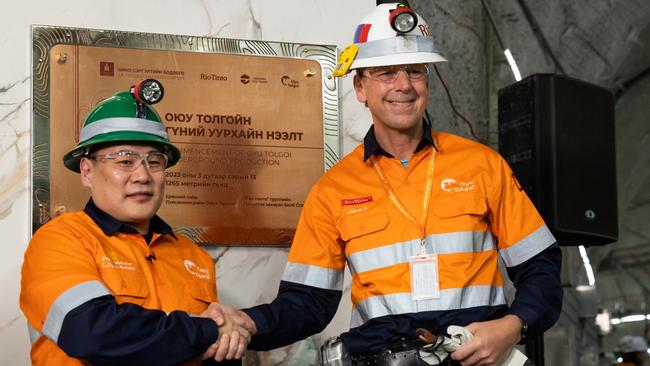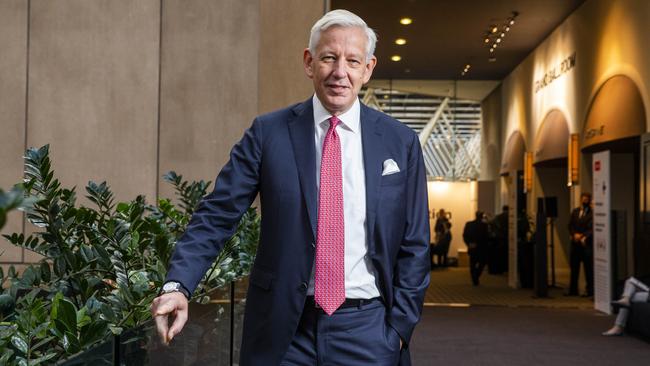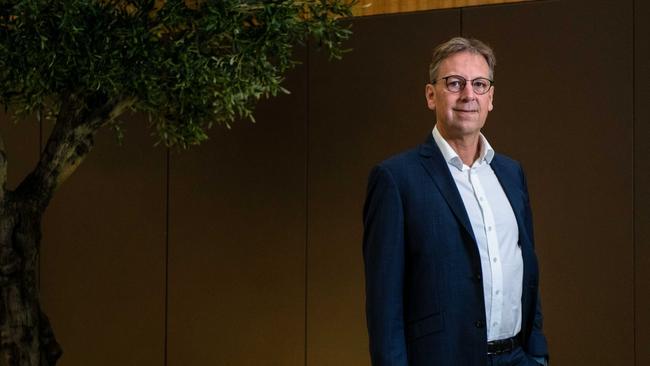Rio Tinto chair Dominic Barton says industry is at an ‘inflection point’ over development tensions
Rio Tinto chair Dominic Barton says the global mining industry is approaching a tipping point in its efforts to convince communities to accept the value of new mine developments.

Rio Tinto chairman Dominic Barton has warned the global mining industry is approaching a tipping point in its efforts to convince communities to accept the value of new mine developments as the world’s energy transition picks up pace.
Speaking at Rio’s London shareholder meeting on Thursday evening, Australian time, Mr Barton said Rio was committed to reducing its own emissions, and to being a major provider of the metals needed to help the global energy transition, such as copper, lithium and aluminium.
But he said mining companies, investors, governments, and communities needed to work better together to resolve the “fundamental tension” between the need for new mines and community opposition to their development.
“We have a critical role to play in enabling the energy transition, supplying essential minerals, including copper, lithium, high-grade iron ore and aluminium, all of which are vital for the transition to a low-carbon economy,” Mr Barton said.
“However, within our new purpose, finding better ways to provide the materials the world needs, there also lies a fundamental tension.
“Meeting the needs of both the energy transition and continued global growth raises environmental and societal dilemmas. The big question to work through together is: how do we fulfil our role in the energy transition in a way that is socially and environmentally responsible, and yet, sufficiently commercial, to attract the investment required?”

Mr Barton said that, despite broad acknowledgment of the need for new sources of minerals critical to the energy transition – he noted International Energy Agency estimates that 700 million tonnes of copper could be needed to electrify networks over the next two decades, as much as has been produced in the world to date – opposition to the establishment of new mines continued to be a problem for the industry.
“The industry is at an inflection point – we can be a catalyst of the green economy and potentially of transformative social impacts as we get to the unexplored corners of the world through mining, processing and recycling,” he said.
“We have key parts of government and society pushing us to develop and expand mining projects, but at the same time we have some stakeholders pushing back on any mining development.”
While Mr Barton was addressing his remarks in the context of the broader industry, Rio faces a number of major challenges to the development of parts of its own portfolio.
The company was last year forced to shelve the development of its vaunted Jadar lithium project in Serbia after community opposition led to the government halting the mine’s approval and development process.
Rio and partner BHP also face considerable opposition from traditional owners in the United States over the development of the massive Resolution copper project in the US. The mining major is still trying to find a way around concerns the mine would destroy areas sacred to local Apache groups.
It is the second time since taking over as chair in May 2022 that Mr Barton has addressed the underlying tensions between shareholders focused on environmental, social and governance issues and commercial realities of the mining industry. The issue is firming as a feature likely to define his leadership of the mining giant’s board.

Late last year Mr Barton told a KPMG podcast he had already noticed a shift in focus from some of Rio’s institutional shareholders, with even previously strong supporters of the company’s push to cut its carbon emissions shifting focus to cash returns to shareholders.
“At the beginning it was all ‘That’s great, focus on decarbonising’,” Mr Barton told the podcast.
“Now there’s a little more: ‘You know what, maybe you don’t need to go as hard on that one’, and the (shareholder) return side is picking up even from some investors who’ve been talking about being strong proponents of the other side.”
Rio Tinto has promised to cut its own carbon emission profile by 50 per cent by 2030, and has committed to net zero by 2050.
But, speaking after Mr Barton, Rio chief executive Jakob Stausholm acknowledged the company was not yet moving quickly enough on cutting its own emissions.
“It is early days and we have not advanced our abatement projects as fast as we would like,” he said.
“But despite that, our Scope 1 and 2 emissions were 7 per cent below our 2018 baseline. It is important to note that this is a multi-decade journey and today we have a more robust road map to our 2030 and 2050 target.”
But, with Rio also needed to win back investor confidence it can regain its crown as the mining’s industry best operator, Mr Barton hinted that the company’s April 19 quarterly production report would show further signs the company was on the road to regain its industry crown.
“We stabilised our operational performance in the second half of the year (2022) and have carried strong momentum into 2023,” he told shareholders.
Rio shares closed down 32c to $116.31 on Thursday.


To join the conversation, please log in. Don't have an account? Register
Join the conversation, you are commenting as Logout